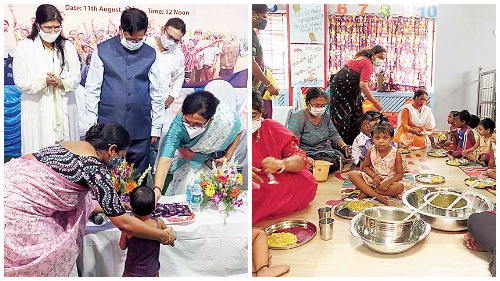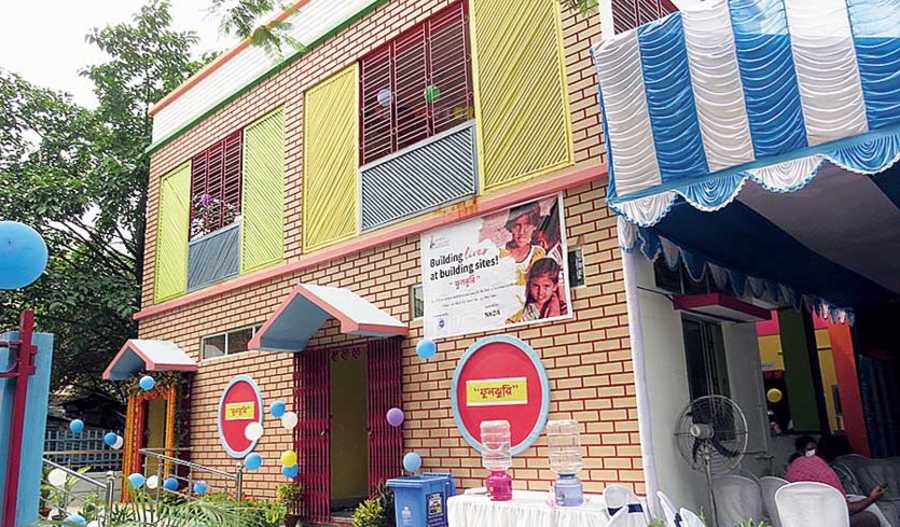For domestic helps, rickshaw-pullers, caretakers or security guards of Action Area 1 in the vicinity of Greenwood Park, a space is now available to take care of their small children while they are away at work. A government day care centre, which was written about in The Telegraph on January 15, is now operational and would not charge them a paisa for the service.
The day care centre, which opened on August 11, is for the children of informal sector workers, aged six months to six years. “We want to make New Town an inclusive city and not just for the well-off. So many pre-school creches have opened. But poor parents going out to work in people’s houses or in the streets cannot afford those creches though they have a great need to ensure safe-keeping of their young children. So this is an experiment we are doing with just 20 children to provide a service to families which stay close by, like Gauranga Nagar or Bagjola Canal side, and work in the vicinity,” said NKDA chairman Debashis Sen.
Named Fuljhuri, the two-storeyed building housing the centre is brightly coloured and has wall art attractive to children in every room and activity space. “This is not a school. Children can stay here from 9am to 5pm, six days a week except Sunday. They will be provided with pre-school education along with three nutritious meals a day — breakfast, lunch and snacks. A parent can drop a child off with proper identity card in the morning and pick him or her up on the way home,” said Sen.
He insisted that that Fuljhuri was an experiment. “We are figuring out how many children we can keep, what are the most suitable operational hours etc. This is a neighbourhood initiative. Once we perfect the model we will replicate this in every locality.”
But NKDA or New Town Kolkata Green Smart City Corporation would not be able to fund all of them, he clarified. “We will look to integrate these centres with the government’s mainstream social welfare projects like Integrated Child Development Scheme or Anganwadi. We will also try to introduce immunisation programmes for polio etc at these centres.”

Children at lunchtime. Minister Chandrima Bhattacharya hands a chocolate to a child at the inauguration. Sudeshna Banerjee
Urban development and municipal affairs minister Chandrima Bhattacharya, who is also the minister of state for health and family welfare, lauded the initiative after inaugurating Fuljhuri. “In many families these days, there is a single child. Being in a group will help children learn to be social and share. But a centre like this cannot run with a large number of children,” she said.
The centre is being managed by a Delhi-based organisation called Mobile Creches which deals with early childhood development. “We work by building capacity of our local partners. Here too we have provided 12-day pre-service and 24-day in-service training to supervisors from our local partner Span,” said Chavi Vohra, head, childcare services of Mobile Creches, who came from Delhi.
All 20 vacancies have long filled up and the centre is getting enquiries daily. “I already have a waiting list of 17 children with documents. But I cannot do much unless there is a vacancy or if a second centre opens,” said supervisor Mausumi Pal.
Each of the 20 children has a story. “A four-year-old is brought by his grandmother on her way to work as a domestic help. His mother has deserted the family while the father is an alcoholic. Another malnourished child has lost his father while the mother is working. They are so needy that I am worried about his future as he is already five years six months old. We cannot keep a child beyond six years,” Pal says.
The admitted children have adjusted well to the roster. “Initially some kids used to cry, some fell ill due to season change. But now 17-18 kids come regularly. They know when their play time is, when lunch would be served and when they need to take a nap,” she smiled.
